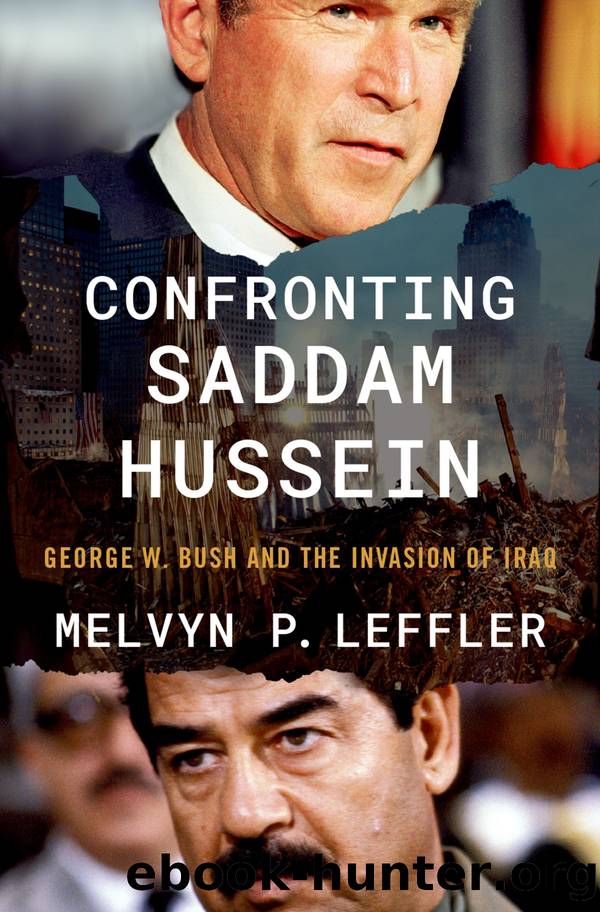Confronting Saddam Hussein by Melvyn P. Leffler

Author:Melvyn P. Leffler
Language: eng
Format: epub
Publisher: Oxford University Press
Published: 2022-01-15T00:00:00+00:00
8
Resolve
In his brief radio address to the nation on Saturday morning, November 9, 2002, President George W. Bush praised the UN Security Council for the passage of Resolution 1411. It meant, Bush declared, that âthe Iraqi regime had to declare and destroy all weapons of mass destruction or face the consequences.â The resolution, he explained, âpresents the Iraqi regime with a test, a final test. Iraq must now, without delay or negotiations, give up its weapons of mass destruction, welcome full inspections, and fundamentally change the approach it has taken for more than a decade. The regime must allow immediate and unrestricted access to every site, every document, and every person identified by inspectors.â The old game of âcheat-and-retreatâ was over. The president would no longer tolerate acts of defiance. âIf Iraq fails to fully comply with the UN resolution, the United States, in coalition with other nations, will disarm Saddam Hussein.â1
The Iraqi regime remained opaque and conflicted. In a speech sent to the Iraqi National Assembly, Saddam Husseinâs powerful son, Uday, denounced UN Security Council Resolution 1441. On November 12, the members of the National Assembly voted unanimously to reject it and sent their recommendation to the governing Revolutionary Command Council over which his father presided. Sadoun Sammadi, the speaker for the National Assembly, said the resolution was simply a pretext for US aggression. Foreign Minister Naji Sabri called on the Arab League to help his country thwart colonial aggression. But on November 13, in a letter to UN Secretary-General Kofi Annan, Sabri reversed himself. Iraq would welcome the inspectors and cooperate with them. Once they affirmed that no weapons of mass destruction existed, the Iraqi regime assumed sanctions would be lifted. The lies and manipulations of the British and American governmentsâtheir history of âinjustice and destructionââwould be exposed to all humanity.2
The Iraqi dictator himself was cagey, secretive, opportunistic, and manipulative. He thought he could outsmart and defy the Americans. He did not think the Bush administration would use force to remove his regime. Believing that Washington had no good reason to invade Iraqâthe United States, in his view, already had a position of preponderance in the region and he was sure they knew he had no weapons of mass destructionâhe calculated that the Americans were playing a game of bluff with him. They wanted to intimidate and force him to flee, but he was confident they would not invade and risk casualties. Americans were cowardly, he believed; they did not have the stomach for bloody battles, mutilated warriors, and body bags. Hussein ruminated with his lieutenants about how the United States had pulled out of Somalia after only a few soldiers had been killed and how they waged war in the Balkans with air power. In 1991, they did not march to Baghdad because they were afraid he would use chemical weapons, and in 1993, even after he tried to assassinate Bushâs father during a post-presidential visit to Kuwait, President Bill Clinton simply blew up his intelligence headquarters. To the Iraqi dictator, this act did not seem bold, but cowardly.
Download
This site does not store any files on its server. We only index and link to content provided by other sites. Please contact the content providers to delete copyright contents if any and email us, we'll remove relevant links or contents immediately.
| Bahrain | Egypt |
| Iran | Iraq |
| Israel & Palestine | Jordan |
| Kuwait | Lebanon |
| Oman | Qatar |
| Saudi Arabia | Syria |
| Turkey | United Arab Emirates |
| Yemen |
Empire of the Sikhs by Patwant Singh(23084)
The Wind in My Hair by Masih Alinejad(5095)
Rise and Kill First by Ronen Bergman(4788)
The Templars by Dan Jones(4689)
The Rape of Nanking by Iris Chang(4211)
12 Strong by Doug Stanton(3549)
Blood and Sand by Alex Von Tunzelmann(3203)
Babylon's Ark by Lawrence Anthony(2677)
The History of Jihad: From Muhammad to ISIS by Spencer Robert(2628)
No Room for Small Dreams by Shimon Peres(2368)
Inside the Middle East by Avi Melamed(2356)
The Turkish Psychedelic Explosion by Daniel Spicer(2356)
Gideon's Spies: The Secret History of the Mossad by Gordon Thomas(2350)
Arabs by Eugene Rogan(2299)
The First Muslim The Story of Muhammad by Lesley Hazleton(2271)
Come, Tell Me How You Live by Mallowan Agatha Christie(2260)
Bus on Jaffa Road by Mike Kelly(2159)
1453 by Roger Crowley(2030)
Kabul 1841-42: Battle Story by Edmund Yorke(2029)
